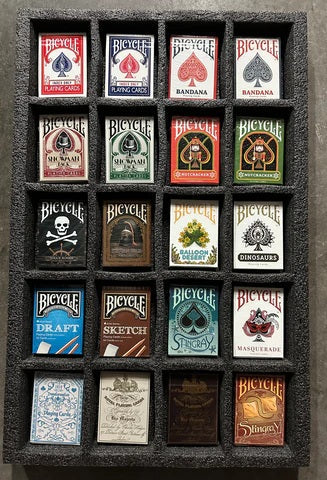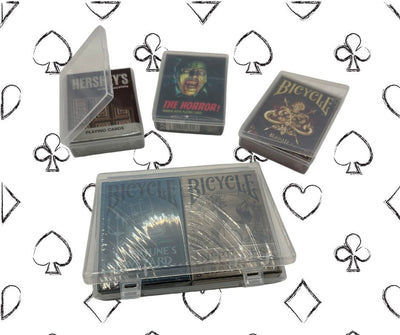
(The set up of a traditional game of Spades)
Card Game Rules
Spades, or Call Bridge, is a traditionally 4 player card game of strategy and luck. Spades uses a standard 52 card deck with Aces high, 2s low, and Spades trumping all. The objective is to win at least as many “tricks” bid.
If you are looking for cards to play Spades with, check out a standard deck here or check out one of our recent arrivals here.
For more trick taking games, check out our guides for Bridge and Euchre.
A free online version of Spades may be found here.
How to Play
Before the game begins an initial dealer must be chosen. To do so, every player is given a card from a shuffled deck and who ever receives the highest card becomes the first dealer. Ties are broken by a repeated deal. The initial dealer shuffles the deck and the player to their right cuts it. The dealer then passes 13 cards one by one clockwise to each of the 4 players.
After everybody receives their cards, bids are made based upon the players’ hand. A bid refers to the players’ expectation of “tricks” they will make in the round. Normally, all players must make a minimum of 1 bid. A trick is given to the player with the highest card in a given round.
After the bids are made, the gameplay begins. The first dealer places any one card down as a lead. In clockwise fashion, each player then places their card down in an attempt to outrank all of the cards in play. A player must only play cards of the same suit as the lead card. If they do not possess cards of the same suit, they may place any of their cards in an attempt to win the trick. The winner of the round becomes the new dealer and the gameplay continues until all cards are dealt.
Note: Players can also rotate the dealer position clockwise instead of making the winner of the trick the new dealer.
Scoring
Points are rewarded in the following fashion. If a player makes their number of bids, 10 points are given to each trick made. Additionally, 1 point is given to each trick made over the initial bids. For example, if a player places 5 bids at the start of the round and makes 6 tricks, the player is given 51 points at the end of the round. 50 points are given for meeting the initial 5 bids and 1 point for the additional trick. 0 points are given to players who fail to win the number of tricks they bid.
Rounds normally continue till a player reaches 500 points to win the whole game.
Gameplay Example
Let us say that the dealer places down a Jack of Hearts as the lead card. The next player has 3 cards of the Heart suit but, none of them beat a Jack. Player #2 sloughs the round and places a 7 of Hearts on the table. The third player places down an Ace of Hearts, winning the trick so far. The fourth player does not have any Hearts and they place their 2 of Spades on the table. Because Spades trump the deck, the fourth player wins the trick and becomes the next dealer.
For more information on the game Spades and its rules check out Wikipedia's article here or pagat's article here .
Spades History

(The Ace of Spades trumps all cards)
Spades was invented around the 1930’s in the United States. It has been described as a descendant of the Whist family of games and even characterized as a simpler version of Bridge. Spades became popular all of the world during the 1940s when U.S. soldiers, who had learned to play it in American, began plying it in Europe during World War II. Because Spades is easily interrupted and relatively simple, it became the perfect card game for soldiers who needed to remain alert in warzones. When the war was over and soldiers returned to the United States, the G.I. Bill caused Spades to become incredibly popular at universities, making college students the main players of the game.
Variations
Spades online can be played in its basic format, as describes above, or players can opt to make the game a little interesting with the following variations.
Teams
Instead of every player for themselves, teams may be introduced to create a new playing dynamic. Normally, teams are made by the two people sitting across from each other. At the end of the game, team members points are tallied together.
Two Players
Instead of the traditional four player game, two people may play Spades in the following way. To deal, players first draw two cards from a faced down shuffled deck. They then decide to throw away one of the cards drawn. Players continue this process until each has 13 cards. Regular gameplay then follows.
Bags
Players can opt to make overtricks (tricks made after the initial bid) into “bags”. Instead of the additional point, if a player makes 10 bags, they are deducted 100 points. The intention of introducing bags is to cause the players to try and win the exact number of ticks they bid.
Face-Up
In the Face-Up variation of Spades, the first 4 cards of the dealt 13 for every player is faced-up. This adds a psychological element to the game as players wonder the decision process behind every move.
Nil
Some variations of Spades allow the player to bid nil for a round. By bidding nil, the player expects to not be able to make any tricks in the game. If the player successfully makes no bids in the round, they receive 100 points. Players may counterattack a nil bid by playing their lowest cards at the start of the game, possibly forcing the nil bidder to place a higher card and breaking their nil bid.
10 for 200 or Wheels
Some variations of Spades allow players or teams to bid 10 for 200. In this bid, a single player or a team is expecting to make 10 tricks in the round. If they make 10 tricks, they receive 200 points. If they fail to make 10 tricks, however, they will lose 200 points.
Joker Trumps
Players can opt to include the two Jokers in the gameplay. If they do so, Jokers become the ultimate trump cards. Specifically, the full color Joker out ranks the one color Joker which outranks the Ace of Spades. When players include the Jokers, they must remove the 2’s of Clubs and Diamonds in order to keep the 52 card count.
Looking for more card games to play? Check out this article:
40+ Great Card Games For All Occasions
About the author: John Taylor is a content writer and freelancer through the company Upwork.com. You may view his freelancing profile here. He has a B. A. in English, with a specialty in technical writing, from Texas A&M University and a M. A. in English from the University of Glasgow. You may view his previous articles about card games here and his LinkedIn profile here.






9 comments
I love spades
I love spades
I’m just a beginner.
When playing partners in spades if your partner takes a trick and you don’t have the suit that was led and your partner has trumped it, can you throw an off suit?
What are the rules to “reneg”? A player didn’t play a heart in that hand. I called her out “renege” when she start playing the hearts later. SHE SAID I HAD TO PICK THE "BOOK " that she didn’t play the heart. I picked second book. IT WAS ACTUAL THE FIRST BOOK. So I was told they didn’t have to give us 3 books because I choose the WRONG BOOK. PLEASE CONFIRM THE RULES FOR RENEGING!